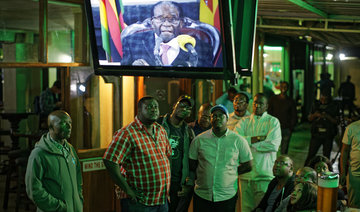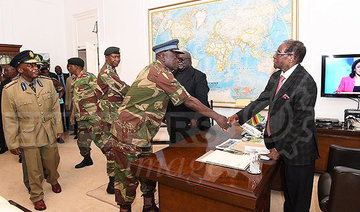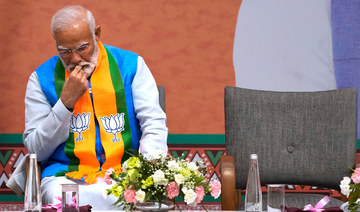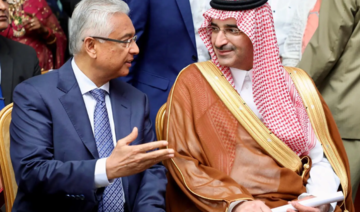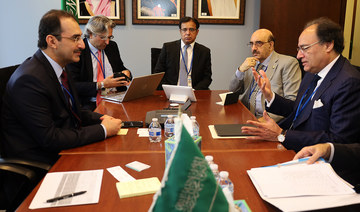HARARE, Zimbabwe: Zimbabwe’s ruling party is set to begin impeachment proceedings against longtime President Robert Mugabe, while a party official says government ministers have been instructed to boycott a Cabinet meeting called by the president.
Ruling party chief whip Lovemore Matuke tells The Associated Press minutes before the Cabinet meeting is expected to start that ministers have been told to instead attend a meeting at party headquarters to work on the impeachment. Parliament resumes Tuesday.
Mugabe’s chief secretary on Monday summoned ministers to the Cabinet meeting at State House, the president’s official residence.
Mugabe is finding himself increasingly isolated.
The military on Monday night said the vice president he recently fired, sparking the political turmoil, will return to Zimbabwe “shortly” and has made contact with Mugabe.
Impeachment of Zimbabwe’s Mugabe set to begin
Impeachment of Zimbabwe’s Mugabe set to begin
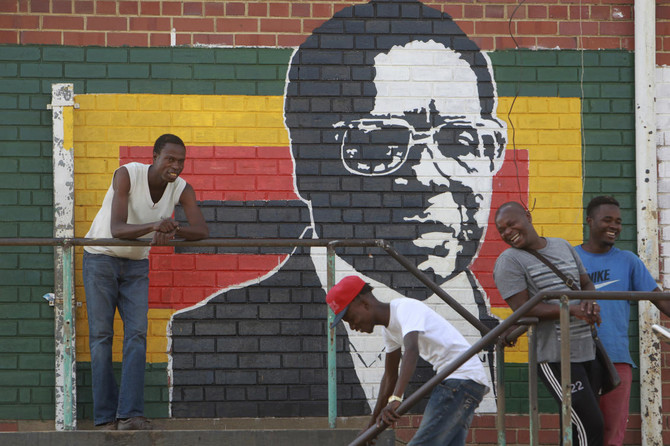
What We Are Reading Today: Out of One, Many

Author: Jennifer T. Roberts
Covering the whole of the ancient Greek experience from its beginnings late in the third millennium BCE to the Roman conquest in 30 BCE, “Out of One, Many” is an accessible and lively introduction to the Greeks and their ways of living and thinking. In this fresh and witty exploration of the thought, culture, society, and history of the Greeks, Jennifer Roberts traces not only the common values that united them across the seas and the centuries, but also the enormous diversity in their ideas and beliefs.
Examining the huge importance to the Greeks of religion, mythology, the Homeric epics, tragic and comic drama, philosophy, and the city-state, the book offers shifting perspectives on an extraordinary and astonishingly creative people.
Century after century, in one medium after another, the Greeks addressed big questions, many of which are still very much with us, from whether gods exist and what happens after we die to what political system is best and how we can know what is real. Yet for all their virtues, Greek men set themselves apart from women and foreigners and profited from the unpaid labor of enslaved workers, and the book also looks at the mixed legacy of the ancient Greeks today.
The result is a rich, wide-ranging, and compelling history of a fascinating and profoundly influential culture in all its complexity—and the myriad ways, good and bad, it continues to shape us today.
Out on bail, firebrand Indian politician poses fresh challenge for Modi

- Kejriwal’s Aam Aadmi Party is in power in the Delhi region and in the northern state of Punjab, which together account for just 20 seats in parliament, out of the 543 being contested
NEW DELHI: Firebrand Indian politician Arvind Kejriwal has hit the ground running since his surprise release from detention in the midst of a contentious general election, energizing the opposition as it challenges Prime Minister Narendra Modi.
The Supreme Court gave 55-year-old Kejriwal, who is also the chief minister of the national capital territory of Delhi, bail in a graft case on May 10 and he wasted no time in getting on the campaign trail.
“I have only one request from you; we all have to come together to save the country from dictatorship. I am fighting this dictatorship with all my might,” he told a jubilant crowd soon after walking out of Delhi’s Tihar jail, clearly referring to Modi.
HIGHLIGHTS
• Delhi voters have mixed reactions to his campaign.
• Kejriwal will generate sympathy but victory unsure, analysts say.
Kejriwal is part of the INDIA alliance led by the Congress Party and one of its biggest crowd-pullers. Analysts say while his campaigning will give fresh impetus to the opposition, they are unsure if that will translate into any significant victories against the ruling Bharatiya Janata Party, which is tipped to return to power.
Kejriwal’s Aam Aadmi Party is in power in the Delhi region and in the northern state of Punjab, which together account for just 20 seats in parliament, out of the 543 being contested.
“He may be able to generate some sympathy vote, but would that be enough to change the outcome of the election?” said Rahul Verma, a fellow at the New Delhi-based Center for Policy Research think tank.
“The BJP led in Delhi by 20 percentage points on an average in each seat, so it needs a substantial amount of swing for BJP to start losing seats in Delhi,” Verma added.
Still, Kejriwal has the ability to embarrass the BJP.
A day after his release, he said Modi, central to the ruling party’s campaign, would not be prime minister beyond 2025 when he turns 75, and would hand over the reins to Home (Interior) Minister Amit Shah.
“Modi made the rule in BJP that whoever turns 75 will be retired. So I ask BJP, who will be your prime minister?” Kejriwal said. “Modi is not seeking for votes for himself, but for Amit Shah...who will fulfil Modi’s guarantees then?“
The BJP scrambled to deny the suggestion that flag-bearer Modi would retire.
ANTI-GRAFT CRUSADER
India began voting on April 19 in the seven-phase election in which Modi, 73, is seeking to be the second prime minister to win a third straight term since independence leader Jawaharlal Nehru.
Delhi goes to the polls on May 25 and Punjab on June 1. Results are due on June 4.
Kejriwal is an anti-corruption crusader-turned-politician with a reputation of being a street-fighter. He projects himself as a messiah of the working class through AAP’s focus on health care, schools and subsidies, and has a high profile image in the media, allowing him to punch above his weight, analysts say.
The Enforcement Directorate, India’s financial crime-fighting agency, arrested him on March 21 in connection with corruption allegations related to the capital territory’s liquor policy.
Kejriwal has dismissed the graft allegations against him as an attempt by Modi’s government to destroy his party and damage the opposition. Modi and the BJP have denied the charges.
Delhi’s voters had mixed reactions to his campaign.
“Giving bail to Kejriwal is like adding fuel to the fire (for the opposition),” said Irshad, 35, a barber in Delhi’s Jahangirpuri area, who gave only his first name. “He’s a genuine leader.”
In the Model Town locality of the capital, vegetable vendor Surya Bali, 33, asked: “If he was not corrupt, why would they send him to jail?“
Some were undecided who they would vote for, including Madhuri Akshay Rajput, 30, a tailor in another part of the city. “Whether Kejriwal has done something wrong or not, going to jail dents your image,” she said. “What’s the point of voting? Nothing has changed.”
For the children of Gaza, war means no school

- Israel has killed more than 35,000 Palestinians, according to Gaza’s Health Ministry
DEIR AL-BALAH: Atef Al-Buhaisi, 6, once dreamed of a career building houses. Now, all he craves is to return to school.
In Israel’s war with Hamas, Atef’s home has been bombed, his teacher killed, and his school in Nuseirat turned into a refuge for displaced people.
He lives in a cramped tent with his family in Deir Al-Balah in central Gaza. He sleeps clinging to his grandmother and fears walking alone, even during the day.
Since the war erupted on Oct. 7, all Gaza’s schools have closed — leaving hundreds of thousands of students like Atef without formal schooling or a safe place to spend their days. Aid groups are scrambling to keep children off the streets, and their minds are focused on something other than the war as heavy fighting continues across the enclave and has expanded into the southern city of Rafah and intensified in the north.

“What we’ve lost most is our children’s future and their education,” said Irada Ismael, Atef’s grandmother.
“Houses and walls are rebuilt, money can be earned again ... but how do I compensate for (his) education?”
Gaza faces a humanitarian crisis, with the head of the UN’s World Food Programme determining a “full-blown famine” is already underway in the north.
More than 35,000 Palestinians have been killed in the war, according to the Gaza Health Ministry.
About 80 percent of Gaza’s population has been driven from homes.
Much of Gaza is damaged or destroyed, including nearly 90 percent of school buildings, according to aid group estimates.
Children are among the most severely affected, with the UN estimating some 19,000 children have been orphaned and nearly a third under the age of 2 face acute malnutrition.
Education experts say that in emergencies, education takes a back seat to safety, health, and sanitation, but the consequences are lasting.
“The immediate focus during conflict isn’t on education, but the disruption has an incredibly long-term effect,” said Sonia Ben Jaafar of the Abdulla Al Ghurair Foundation, a philanthropic organization focused on education in the Arab world.
“The cost at this point is immeasurable.”
According to the UN, Gaza had a highly literate population that included more than 625,000 students and some 20,000 teachers before the war.
In other conflicts, aid groups can create safe spaces for children in neighboring countries — for example, Poland for shelter and schooling during the war in Ukraine.
That’s impossible in Gaza, a densely populated enclave between the sea, Israel, and Egypt. Since Oct 7, Palestinians from Gaza haven’t been allowed to cross into Israel. Egypt has let a small number of Palestinians leave.
“They’re unable to flee, and they remain in an area that continues to be battered,” said Tess Ingram of UNICEF.
“It’s very hard to provide them with certain services, such as mental health and psychosocial support or consistent education and learning.”
Aid groups hope classes will resume by September. But even if a ceasefire is brokered, much of Gaza must be cleared of mines, and rebuilding schools could take years.
In the interim, aid groups are providing recreational activities — games, drawing, drama, art — not for a curriculum-based education but to keep children engaged and in a routine in an effort for normalcy. Even then, advocates say, attention often turns to the war — Atef’s grandmother sees him draw pictures only of tents, planes, and missiles.
Finding free space is among the biggest challenges.
Some volunteers use the outdoors, make do inside tents where people live, or find a room in still-standing homes.
It took volunteer teachers over two months to clear one room in a school in Deir Al-Balah to give ad hoc classes to children. Getting simple supplies such as soccer balls and stationery into Gaza can also take months, groups report.
“Having safe spaces for children to gather to play and learn is an important step,” Ingram said, but “ultimately, the children of Gaza must be able to return to learning curriculum from teachers in classrooms, with education materials and all the other support schooling provides.”
This month, UNICEF had planned to erect at least 50 tents in Rafah for play-based numbers and literacy learning for some 6,000 children from preschool to grade 12. But UNICEF says Israel’s operation there could disrupt those plans.
Lack of schooling can take a psychological toll — it disrupts daily life and, compounded with conflict, makes children more prone to anxiety and nervousness, said Jesus Miguel Perez Cazorla, a mental health expert with the International Committee of the Red Cross.
Children in conflicts are also at increased risk of forced labor, sexual violence, trafficking, and recruitment by gangs and armed groups, experts warn.
“Not only are children vulnerable to recruitment by Hamas and other militant groups, but living amid ongoing violence and constantly losing family members makes children psychologically primed to want to take action against the groups they consider responsible,” said Samantha Nutt of War Child USA, which supports children and families in war zones.
Palestinians say they have seen more children take to Gaza’s streets since the war, trying to earn money for their families.
“The streets are full of children selling very simple things, such as chocolate and canned goods,” said Lama Nidal Alzaanin, 18, who was in her last year of high school and looking forward to university when the war broke out. There is nothing for them to do.”
Some parents try to find small ways to teach their children, scrounging for notebooks and pens and insisting they learn something as small as a new word each day. But many find the kids are too distracted with the world at war.
Sabreen Al-Khatib, a mother whose family was displaced to Deir Al-Balah from Gaza City, said it’s particularly hard for the many who’ve seen relatives die.
“When you speak in front of children,” Al-Khatib said, “what do you think he is thinking? Will he think about education? Or about himself, how will he die?”
On Oct. 7, 14-year-old Layan Nidal Alzaanin — Lama’s younger sister — was on her way to her middle school in Beit Hanoun when missiles flew overhead, she said. She fled with her family to Rafah, where they lived crowded in a tent.
Since Israel ordered evacuations there, she fled to Deir Al-Balah.
“It is a disaster,” she said.
“My dreams have been shattered. There is no future for me without school.”
Punjab administration orders shortened school hours due to looming heatwaves

- A notification orders schools to ensure all fans are in working condition and water coolers available
- Provincial government has also announced summer vacation for all schools from June 1 to August 14
ISLAMABAD: The provincial administration of Punjab announced on Friday it would cut short the usual timings of all public and private schools for the rest of the month amid rising temperatures and warnings from the Meteorological Department of impending heatwaves in the coming weeks.
Just a day earlier, the Met Department warned that a major heatwave was set to engulf much of the country next week, with daytime temperatures expected to rise four to six degrees Celsius above the average.
It also predicted dust storms and heavy rains in various parts of Pakistan, including Punjab.
“In the wake of severe weather, it is hereby notified that following School timings shall be observed in all Public and Private Schools in the Province of Punjab with effect from 18th May to 31st May, 2024,” said a notification circulated by the provincial education department, showing 7 AM as the starting time and 11:30 AM as the finishing hour.
It instructed the schools to end classes at 10:30 AM on Friday and Saturday.
The notification also instructed the school authorities to ensure that all fans were in working condition, water coolers were available and no student was made to sit in uncovered and open spaces like lawns in summer season.
Another notification also announced that all the schools in the province will remain closed from June 1 to August 14 for summer vacation.
“All schools in the province shall reopen with effect from Thursday 15th August, 2024,” it added.
In recent years, Pakistan has experienced extreme weather patterns, including unprecedented rains, flash floods, droughts and heatwaves.
Experts attribute these erratic weather patterns to climate change, placing Pakistan among the ten countries most vulnerable to its impacts.
Saudi fund signs two loan agreements, inaugurates Hulhumale Island development in Maldives

- Al-Marshad participated in the partial inauguration of the Hulhulmale Island Development Project
MALE: CEO of the Saudi Fund for Development Sultan bin Abdulrahman Al-Marshad signed on Friday two development loan agreements with the Maldives’ Minister of Finance Dr. Mohammed Shafiq. These agreements will contribute to financing the Velana International Airport development project with a value of $100 million and the healthcare sector development project in the Maldives with a value of $50 million, provided by fund.
Additionally, Al-Marshad participated in the partial inauguration of the Hulhulmale Island Development Project, which the SFD is contributing to financing through a soft development loan worth $80 million. The event was also attended by Saudi Ambassador to the Maldives Matrek bin Abdullah Al-Ajalin.



